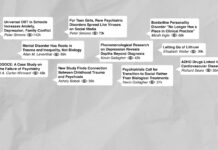Deep Flaws in FDA Oversight of Medical Devices, and Patient Harm, Exposed in Lawsuits
From KFF Health News: A yearlong investigation by KFF Health News revealed that a series of FDA-cleared products have been suspected of contributing to thousands of injuries and patient deaths.
The Power of Distress in an Unhealthy World
From Psychology Today/Joanna Cheek MD: Diagnoses take on a life of their own, when we try to treat "the depression" instead of addressing the problem it’s signaling.
Winding Back the Clock: What If the STAR*D Investigators Had Told the Truth?
The STAR*D Study has been cited as real-world evidence of the efficacy of antidepressants. In truth, it told of a failed paradigm of care.
De-privatizing Our Relationships
I’m glad we’re chipping away at the cracks in psychiatry and psychology and de-privatizing our lives.
Much of U.S. Healthcare Is Broken: How to Fix It (Chapter 2, Part 2)
Les Ruthven addresses the scientific literature on antidepressant efficacy and FDA approval.
An Inability to Visualize the Future (Let Alone a Positive One) Is a Hallmark...
From Psychology Today/Annie Wright, LMFT: It sounds unbelievable to someone with a trauma history that there are people who can think forward decades into the future, visualize a happy outcome for themselves and then work backward, taking steps that secure that future.
Mad in America’s 10 Most Popular Articles in 2023
A roundup of Mad in America's most read blogs and personal stories of 2023 as chosen by our readers.
Dr. Gordon Warme: The Curious Case of an Unconventional Psychiatrist
Dr. Warme bucked convention, examining the cultural role that shamans, witch doctors, and placebo cures played in medicine.
As Foundation for ‘Excited Delirium’ Diagnosis Cracks, Fallout Spreads
From KFF Health News: The campaign against excited delirium seeks to transform the way police deal with people undergoing mental health crises. “This is really about saving lives,” said attorney Joanna Naples-Mitchell.
Conservatorship: The Racket That Ruined My Father’s Last Years
I have watched as my father’s pursuit of happiness was swept away by the court system in his senior years.
FDA Warning and Matthew Perry’s Death Darken Ketamine’s Glow
From The Washington Post: Federal health authorities are intensifying their scrutiny of the drug ketamine for "treating mental health disorders," as the mind-altering compound grows in popularity despite the lack of regulatory approval for such use.
Trying to Fly Above—An Example of Sequencity
I consider synchronicity and sequencity connections to be gifts. The meaning involved is often much deeper and more personal than other people will recognize.
The Infant as Reflection of Soul: The Time Before There Was Self
From World Association for Infant Mental Health: By the time most of us reach adulthood, we have not only lost the capacity to regularly access states that we achieved routinely as infants, but we have also lost awareness of that loss.
Antidepressant Exposure In Utero May Negatively Impact Motor Skills in 2-Year-Old Children
A new study in Frontiers of Pharmacology finds that antidepressant use during pregnancy is linked to reduced motor skills in children at 2 years...
Much of U.S. Healthcare Is Broken: How to Fix It (Chapter 2, Part 1)
Beginning the discussion on depression and antidepressant drugs. Are they as effective and safe as psychiatry claims?
Placebo Effect—Not Antidepressants—Responsible for Depression Improvement
In adolescent depression treatment, those who received a placebo but thought they received Prozac improved more than those who received the drug and knew it.
Not Just a Dream: Finding the Mental Health Community I’d Been Longing For
I dreamed of a place where healers weren’t afraid of intense states like madness. They embraced it; maybe they’d been through it themselves.
2023 in Review: A Paradigm Shift Is Underway
Our growing community is eager to change the narrative of psychiatry. And that is how paradigm shifts occur: the collective voice for radical change grows ever louder.
Therapy by Script Undermines Healing; Connection Is the Key
Healing from our deepest wounds comes through being in connection with people who cherish us and take us seriously.
Can the Rate of Antidepressant Prescribing Be Reversed?
From Psychology Today: “Population dependence on mood pills looks like a fantastic marketing strategy, but it must be over-the-top and we must be missing something," said psychiatrist and professor Eugene Breen in Dublin.
Idaho Keeps Some Psych Patients in Prison, Ignoring Decades of Warnings About the Practice
From ProPublica: A temporary program for “dangerously mentally ill” patients has continued for five decades, despite calls from critics to provide better care. Soon, Idaho will be the only state still using prisons to house patients who face no criminal charges.
Robert Whitaker Answers Reader Questions on Pharma Marketing and Psychiatric Drugs
In Part 2 of our reader Q&A podcast, MIA founder Robert Whitaker answers questions on pharmaceutical marketing and issues with psychiatric treatments including psychiatric drugs and electroconvulsive therapy.
Reimagining Crisis Support: A Conversation with Tina Minkowitz
The mental health system is always trying to get more resources for itself, insinuate itself into every aspect of life, subsuming every aspect of the fulfillment of human rights.
Irish Orgs. Pledge to Adopt ‘Human Rights-Based Approach’ to Mental Health Care
From The Irish Times: A new training approach to mental health care was launched by the Irish Mental Health Commission, coinciding with a report finding the use of restraints and seclusion has been decreasing in the country.
Much of U.S. Healthcare Is Broken: How to Fix It (Chapter 1, Part 3)
About healthcare's focus on back end treatment rather than front end treatment: treating the symptoms rather than the causes of the health condition.

































